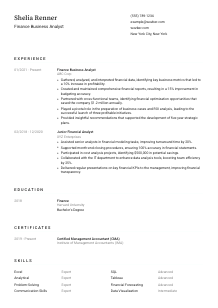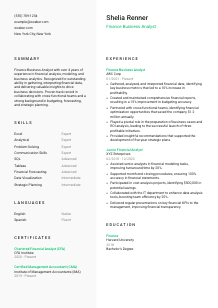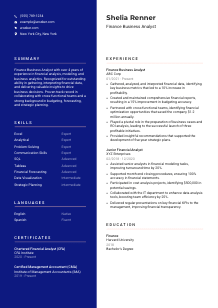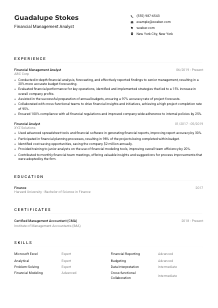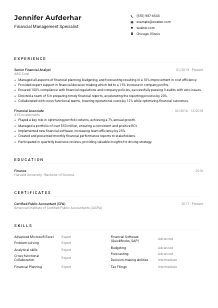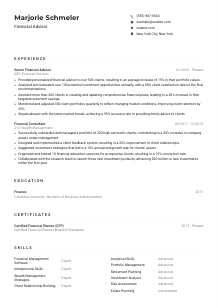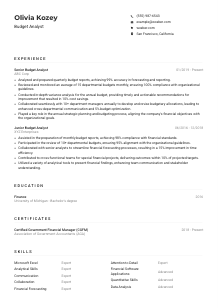Finance Business Analyst CV Example
Delving into fiscal puzzles, but your CV doesn't add up? Explore this Finance Business Analyst CV example, engineered with Wozber free CV builder. Grasp how to articulate your analytical acumen to meet job prerequisites, paving a career path that's as robust as your financial models!
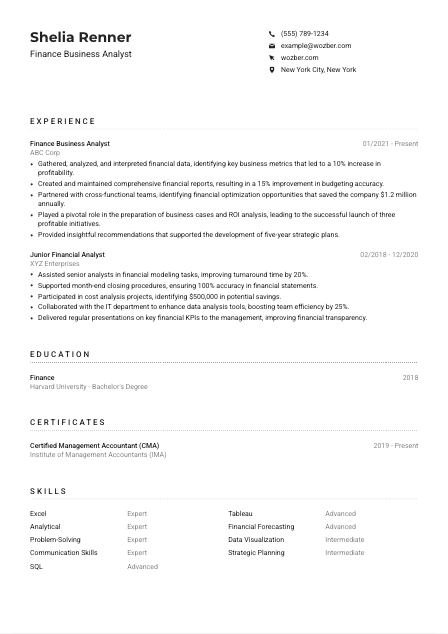
How to write a Finance Business Analyst CV?
As a future Finance Business Analyst, you're embarking on a path that requires precision, analytical prowess, and a knack for transforming complex data into actionable insights. Your journey begins with crafting a CV that doesn't just list your experiences but shouts your capabilities from the rooftops. In the realm of finance, your CV is more than a document; it's a ledger of your professional journey.
With the aid of Wozber's free CV builder, this guide is sculpted to help you create an ATS-compliant CV that resonates with the specific demands of your desired role. Let's demystify the process of aligning your CV with a job description that reads like a finance analyst's dream.
Personal Details
In the vast sea of CVs, your personal details serve as the lighthouse, guiding hiring managers to your shores. For a Finance Business Analyst role, precision starts here. Let's ensure this section isn't just accurate but a beacon of relevance.
1. Name: Your Brand
Consider your name the corporate heading of your professional document. Make sure it stands out with a clear, professionally styled font to ensure it's the first thing to catch the hiring manager's attention.
2. Target Job Title
Directly below your name, adapt the title from the job description to position yourself as the perfect candidate from the get-go. For instance, using 'Finance Business Analyst' immediately aligns your personal brand with the role.
3. Contact Essentials
Every digit and letter in your contact info counts. Your phone number and a professional email address (preferably a combination of your first and last name) are mandatory. This isn't just about being reachable; it's about presentation and attention to detail.
4. Location Specificity
Considering our job description highlights New York City, explicitly stating 'New York City, New York' in your location aligns you with the employer's geographical requirements. This small detail subtly confirms your suitability and eliminates potential concerns about relocation.
5. Digital Professionalism
Including a LinkedIn profile or a personal website can greatly enhance your CV's depth. For a finance professional, a well-maintained LinkedIn profile acts as an extended portfolio of your professional achievements and network.
Takeaway
Let's not forget, the personal details section is more than an opener; it's an assurance of professional alignment. It's akin to opening a ledger with the right figures. Precision here sets the tone for the rest of your CV. Keep it professional, relevant, and preemptively aligned with the job at stake.





Experience
The experience section is your report card, showcasing your fiscal acumen and analytical diligence. Let's transform your experience into a compelling narrative that speaks directly to the heart of a Finance Business Analyst.
- Gathered, analyzed, and interpreted financial data, identifying key business metrics that led to a 10% increase in profitability.
- Created and maintained comprehensive financial reports, resulting in a 15% improvement in budgeting accuracy.
- Partnered with cross‑functional teams, identifying financial optimisation opportunities that saved the company $1.2 million annually.
- Played a pivotal role in the preparation of business cases and ROI analysis, leading to the successful launch of three profitable initiatives.
- Provided insightful recommendations that supported the development of five‑year strategic plans.
- Assisted senior analysts in financial modeling tasks, improving turnaround time by 20%.
- Supported month‑end closing procedures, ensuring 100% accuracy in financial statements.
- Participated in cost analysis projects, identifying $500,000 in potential savings.
- Collaborated with the IT department to enhance data analysis tools, boosting team efficiency by 25%.
- Delivered regular presentations on key financial KPIs to the management, improving financial transparency.
1. Job Description Breakdown
Begin by parsing the provided job description. Mark responsibilities and accomplishments that you've mirrored in your career. This isn't just about matching keywords; it's about understanding the essence of what makes a successful Finance Business Analyst.
2. Chronological Clarity
Organize your roles chronologically, starting with your most recent position. Each entry should clearly state your job title, company name, and the dates of your tenure. This format not only respects the reader's time but adheres to the preferred structure for ATS scanners.
3. Achievement Tailoring
For each role, include accomplishments that reflect the prerequisites of the job description. For instance, 'Gathered, analyzed, and interpreted financial data, leading to a 10% increase in profitability' directly mirrors the job's demand for financial data analysis and interpretation.
4. Quantification of Success
Whenever possible, quantify your achievements. Numbers provide a tangible measure of your impact, like the '15% improvement in budgeting accuracy' or 'saved the company $1.2 million annually'. This makes your contributions palpable and memorable.
5. Relevance Over Volume
Resist the urge to list every task you've ever tackled. Focus on experiences that showcase your financial modeling, analytics, cross-functional teamwork, and strategic insight. This keeps your CV focused and powerful.
Takeaway
Your experience section is not just a chronicle of your work history; it's a portfolio of your professional impact. Use it to demonstrate that you're not just a qualified candidate, but a Finance Business Analyst who makes a difference. Let each bullet point build your case, showing that you're the solution the hiring manager has been searching for.
Education
For a Finance Business Analyst, education isn't just a formality; it's the bedrock of your analytical capabilities. Let's frame your education as more than dates and institutions; it's a showcase of your readiness for this role.
1. Key Requirement Identification
Start by pinpointing the educational prerequisites from the job posting. Our example specifies a 'Bachelor's degree in Finance, Accounting, or a related field'. This immediately becomes a cornerstone of your education section.
2. Simplicity and Structure
List your degree in a straightforward manner. Start with the degree type, followed by the field of study, the institution, and your graduation year. This clarity and consistency cater to both human readers and ATS compliance.
3. Tailored Degree Presentation
When your degree directly aligns with the job requirements, make it abundantly clear. If you pursued a 'Bachelor's Degree in Finance', state it as such. This direct correlation strengthens your position as a tailored fit for the role.
4. Coursework Highlights
Though not always necessary, highlighting specific coursework can be beneficial, especially if it reinforces the job's skill requirements. For early-career professionals, this can compensate for a thinner experience section.
5. Beyond the Degree
Additional educational achievements, whether honors, relevant extracurriculars, or significant projects, can be worth mentioning if they underscore your fit for the Finance Business Analyst role. Gauge their relevance based on the level of the position you're applying for.
Takeaway
The way you present your education should reflect not just the completion of a degree but your journey towards becoming a Finance Business Analyst. Every element, from your major to relevant coursework, is a building block showcasing your foundation in finance and analytics. Let your education section be a testament to your readiness to tackle the challenges of the financial world.
Certificates
In the world of finance, certifications like the CMA or CFA are not just accolades; they're proof of your dedication to your craft. Let's ensure your certificate section bolsters your candidacy, emphasizing your ongoing commitment to excellence.
1. Job Requirement Assessment
The job description mentions that the CMA or CFA designation is a plus. This acknowledgment of certifications elevates their importance in your CV. It indicates a proactive pursuit of professional growth and specialization.
2. Certificate Selection
Include those certifications that directly align with the job's demands. Here, the focus will be on your CMA and CFA certifications, shining a spotlight on your advanced knowledge and ethical obligations in the financial realm.
3. Date Precision
For certificates with an acquisition or expiration date, clarity is key. Stating that you've been a CFA charterholder 'since 2020' informs the hiring manager of your sustained commitment and expertise.
4. Continuous Learning
The finance industry is ever-evolving. Showcasing recent certificates or ones relevant to emerging financial technologies or methodologies underscores your adaptability and fervor for staying ahead in your field.
Takeaway
Certificates are not just ornaments for your CV; they are emblematic of your ongoing dedication to your professional development. They provide tangible proof of your specialized knowledge and analytical proficiency, setting you apart in the competitive world of finance. Let each certification serve as a seal of your commitment to excellence.
Skills
Your skills section is a concise display of the analytical tools at your disposal. But it's more than a list; it's a strategically compiled portfolio that instantly communicates your capability to fulfill the Finance Business Analyst's role.
1. Extracting Job Requirement Skills
The first step involves dissecting the job posting to identify both explicit and implied skills. Skills such as 'strong proficiency with Excel' not only match the job requirements but also signal your expertise in financial analysis.
2. Matching and Listing
Prioritize skills that directly reflect the job description, such as your proficiency in Excel, SQL, and Tableau. This direct matching strategy ensures your CV resonates with the critical needs of the role and speaks the language of potential employers.
3. Skills Organisation
While it may be tempting to list every skill you've acquired, restraint is key. Curate a list that balances hard skills, like 'financial modeling', with soft skills, such as 'problem-solving', ensuring each is relevant and adds value to your candidacy for a Finance Business Analyst position.
Takeaway
Consider your skills section as the balance sheet of your professional capabilities, showcasing assets that align with the job's requirements. By carefully selecting and presenting your skills, you position yourself as not just a well-qualified candidate, but as the answer to the hiring manager's needs. Let your skills reflect your readiness to analyze, model, and transform financial data into strategic business decisions.
Languages
In the global landscape of finance, linguistic diversity can be a significant asset. Navigating through linguistic capabilities might seem straightforward, but here's how to position your linguistic skills as a unique value proposition.
1. Job Description Language Analysis
Our example highlights 'Strong English fluency'. In this context, placing your native or fluent proficiency in English at the forefront immediately addresses a primary requirement of the role.
2. Prioritization of Languages
If you speak multiple languages, listing them in order of relevance to the job can be a strategic advantage. Yet, the proficiency level for each is crucial. Being 'Fluent in Spanish' adds value, reflecting your capability to engage in a broader spectrum of business environments.
3. Language Proficiency Clarity
Be clear about your level of proficiency in each language listed. Terms such as 'Native', 'Fluent', 'Intermediate', and 'Basic' provide a quick snapshot of your linguistic capabilities, allowing for a straightforward assessment of your communication skills.
4. Scope of the Role and Languages
Understanding the broader scope of the Finance Business Analyst role can help tailor this section. If the role engages with international markets or teams, emphasizing your multilingual talents could significantly bolster your attractiveness as a candidate.
5. Honesty is the Best Policy
Maintaining integrity in your language proficiency claims is vital. Overstating your abilities can lead to challenges down the line. Instead, view each language you speak as a testament to your cultural agility and ability to adapt in diverse settings.
Takeaway
Your ability to communicate in multiple languages isn't just a skill—it's an open door to opportunities and a testament to your adaptability in the global business arena. Whether negotiating in English or conversing with a Spanish-speaking colleague, your linguistic prowess enhances your professional profile and positions you as a versatile asset in the finance sector. Embrace these skills as integral components of your professional toolkit.
Summary
The summary serves as the executive summary of your professional life. It's your chance to hook the reader with a compelling narrative of who you are as a Finance Business Analyst. Let's ensure it's not just informative, but magnetic.
1. Digesting the Role
Understand the essence of the Finance Business Analyst position. This understanding will ground your summary, ensuring it's a direct reflection of both your career journey and the role you're aiming to secure.
2. Professional Introduction
Begin with a statement that encapsulates your professional identity. 'Finance Business Analyst with over 4 years of experience in financial analysis, modeling, and business analytics' immediately conveys your expertise and area of specialization.
3. Highlighting Key Skills and Achievements
Mention a selection of achievements and skills that align with the job's requirements. This might include your proficiency in Excel, SQL, and strategic planning. Demonstrating your impact, such as 'leading to the successful launch of three profitable initiatives', paints a picture of your capability and success.
4. Brevity with Impact
Keep your summary concise, aiming for 3-5 impactful lines. This section is the appetizer, enticing hiring managers to dig deeper into the feast of experiences and achievements that follow in your CV.
Takeaway
Crafting a compelling summary is akin to presenting a business case for your candidacy. It's your chance to grab attention, make a memorable first impression, and set the stage for the detailed narrative of your professional achievements that unfolds in the rest of your CV. Treat it as your personal pitch, summarizing your qualifications, achievements, and the unique value you bring to the role of a Finance Business Analyst.
Launching Your Finance Business Analyst Journey
Congratulations on taking this critical step towards securing your next role as a Finance Business Analyst! Armed with the knowledge of how to craft an ATS-compliant CV using Wozber's free CV builder, including free ATS-friendly CV templates and ATS CV scanner for keyword optimisation, you're now primed to make your mark. Your CV is more than a document; it's the narrative of your career, distilled into a form that showcases your unique value in the world of finance. Go forth, with confidence and precision, and let your CV open the doors to new opportunities and challenges.
The finance world awaits your analytical brilliance and strategic insight. Here's to the next chapter in your professional journey!

- Bachelor's degree in Finance, Accounting, or a related field.
- Minimum of 3 years of experience in financial analysis or business analytics.
- Strong proficiency with financial modeling and data analysis tools such as Excel, SQL, or Tableau.
- Exceptional analytical, problem-solving, and communication skills, both written and verbal.
- Certified Management Accountant (CMA) or Chartered Financial Analyst (CFA) designation is a plus.
- Strong English fluency is essential for this role.
- Must be located in New York City, New York.
- Gather, analyze, and interpret financial data, key business metrics, and trends to support senior management decision-making.
- Create and maintain regular financial reports, including budgeting, forecasting, and variance analysis.
- Partner with cross-functional teams to identify opportunities for financial optimization and process improvement.
- Assist in the preparation of business cases, ROI analysis, and financial presentations for new initiatives or investments.
- Provide insightful recommendations and support in the development of long-term strategic plans.





